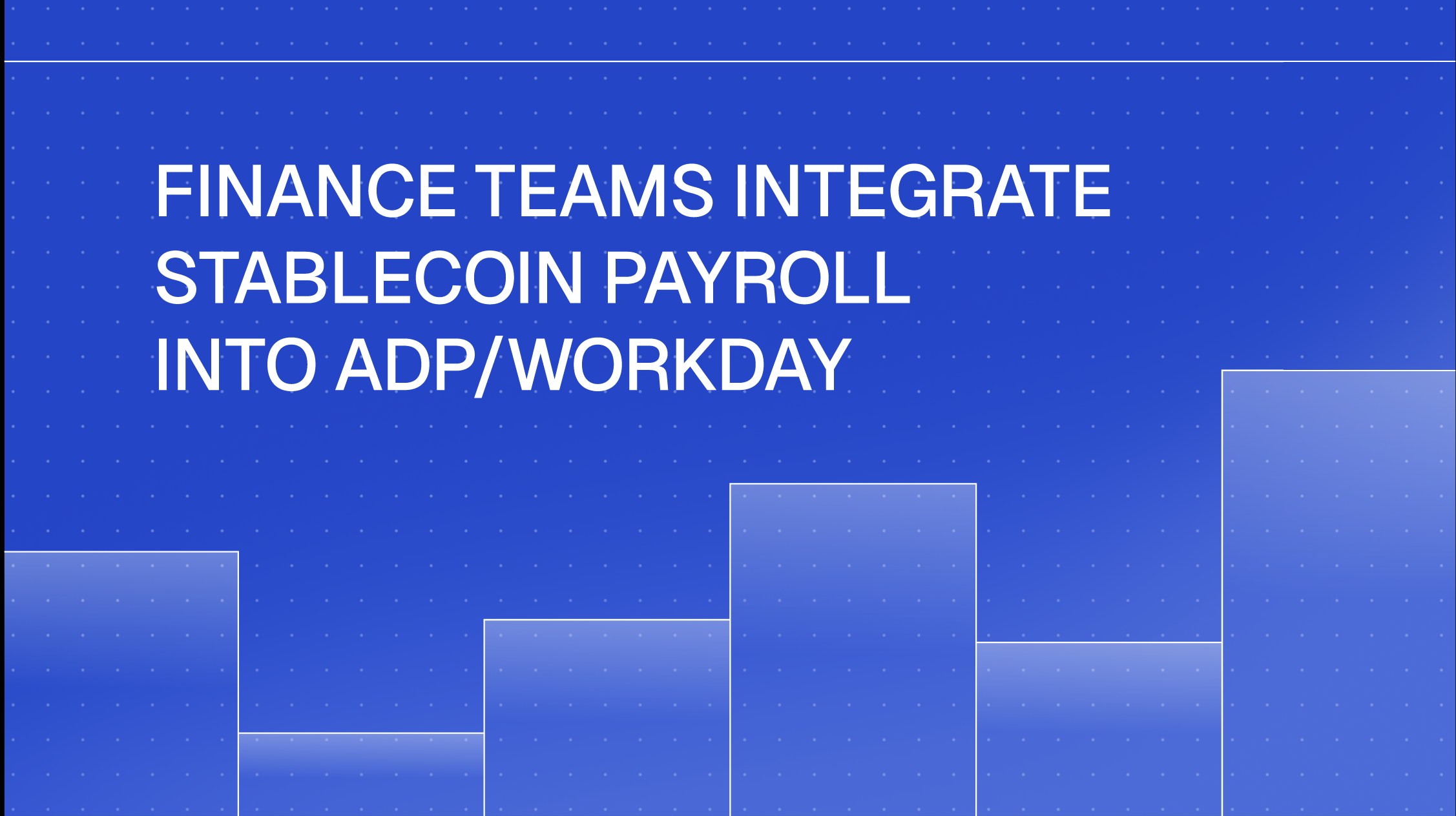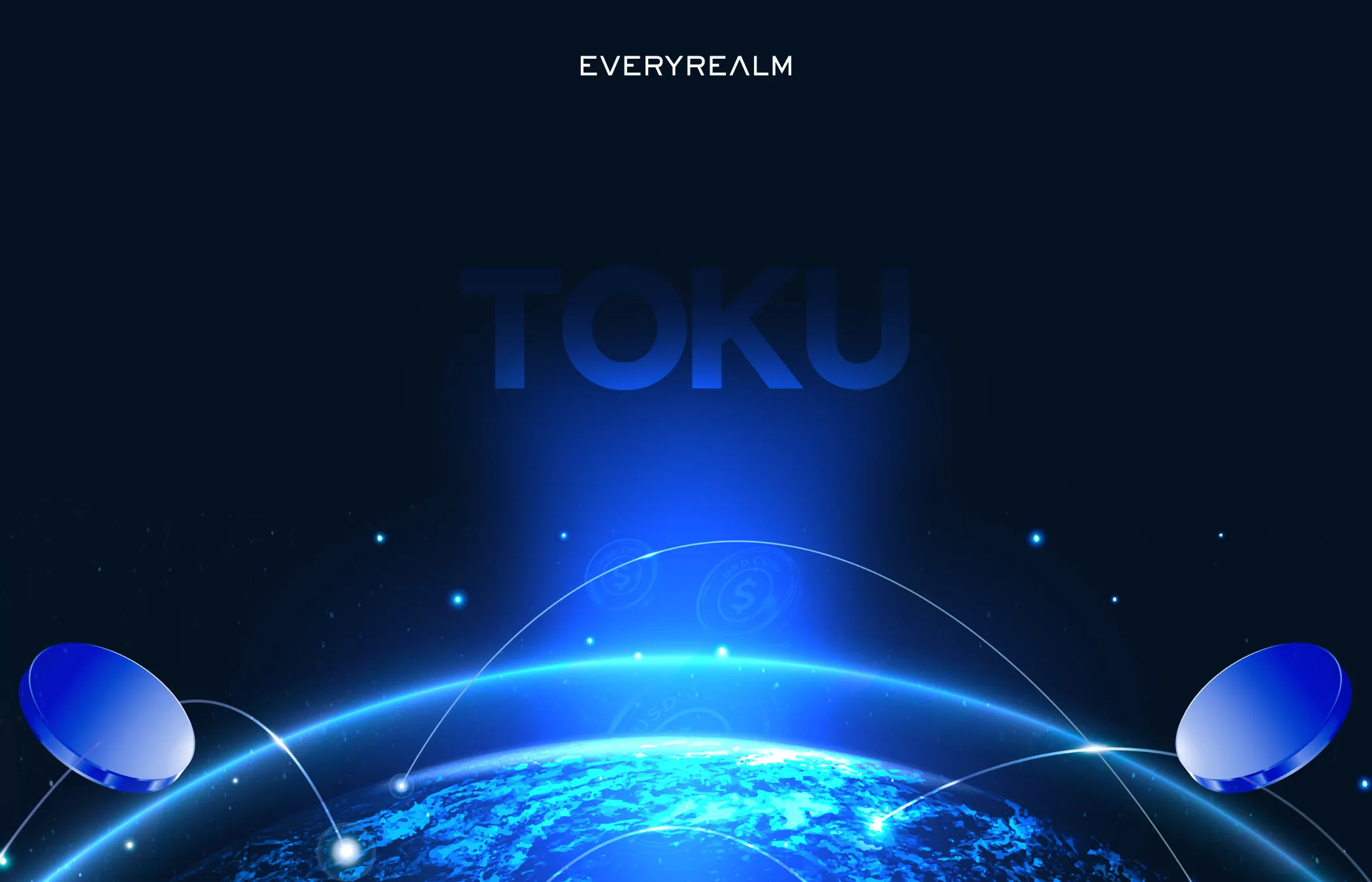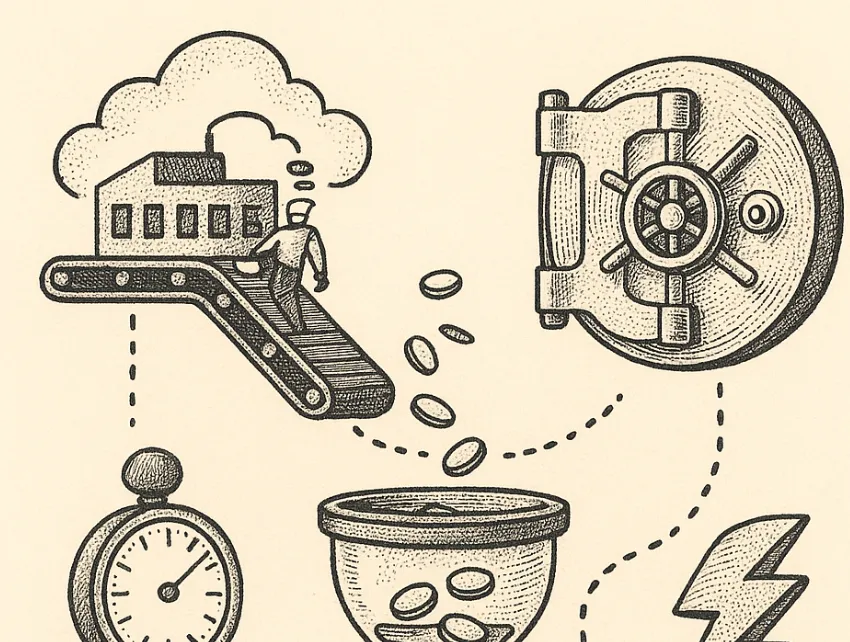
How Finance Teams Integrate Stablecoin Payroll into ADP and Workday Without Disruption
Learn how finance teams use Toku to integrate stablecoin payroll into ADP and Workday - compliantly and without disrupting existing systems.

.avif)
What You’ll Learn
- How to add stablecoin payroll to ADP and Workday without migrations
- A step-by-step integration flow from data sync to reconciliation
- Compliance guardrails for U.S. and global payroll programs
- Security and treasury controls that satisfy Finance and Audit
The Payroll Revolution Is Already Here
If you manage a global team, you already know the friction. Payments crawl across borders. Wire fees stack up. Contractors ping your team asking, “Did it land yet?” Meanwhile, leadership wants faster cycles, cleaner reconciliation, and fewer manual steps.
Stablecoin payroll is how forward-thinking finance teams are solving this - without ripping out their existing systems. It’s not about going full crypto. It’s about adding instant, compliant payout rails behind the scenes while keeping the processes you already trust in ADP, Workday, or your HRIS.
That’s where Toku comes in.
Toku’s stablecoin payroll solution integrates directly with your existing stack - no migrations, no new systems to learn, no compliance risk. You keep ADP and Workday as your source of truth. Toku adds the blockchain execution layer and syncs everything back, fully reconciled and audit-ready.
Why does this matter? Because payroll doesn’t live in isolation. It’s embedded in your approval flows, accounting processes, tax logic, and compliance stack. Toku respects that. Our approach is simple: integrate, don’t replace.
Learn how Toku integrates with ADP and Workday →
Why Finance Teams Are Turning to Stablecoins
Traditional payroll was never designed for global speed. Especially not for teams spread across the world. The result? Delays, fees, friction - and a finance team stuck chasing clarity every month.
Here’s what that looks like in real life:
- Wires take days, especially for cross-border contractors and subsidiaries.
- FX fees quietly erode budgets, with poor transparency and bank markup spreads.
- Payment status is murky, forcing payroll ops teams to field “Where’s my money?” tickets.
- Compliance workflows are fragmented, with manual steps to reconcile local rules.
Stablecoins flip this equation.
- Payments settle in seconds, not days.
- No FX spreads or surprise wire fees, just programmable, on-chain transfers.
- Always-on rails, available 24/7, not just during banking hours.
- Transparent audit trails, complete with transaction hashes and timestamps.
But speed and cost savings aren’t enough. To get buy-in from Finance, Legal, and Compliance, stablecoin payroll has to work with your systems - not around them.
That’s why Toku exists.
We take the benefits of stablecoins - instant settlement, global reach, programmable compliance - and package them in a way that’s usable and safe for modern finance teams. No custody risk. No manual exports. No awkward off-chain workarounds.
Toku plugs stablecoin payroll directly into your trusted HRIS and payroll tools, like ADP and Workday. You get faster cycles, lower costs, and full visibility - without giving up control or introducing risk.
Explore how stablecoin payroll works at Toku →
Why ADP and Workday Don’t (and Shouldn’t) Handle Crypto Natively
ADP and Workday are great at what they’re built for: processing fiat payroll at scale, managing complex HR workflows, and keeping compliance airtight in traditional finance environments.
But when it comes to blockchain-based payouts - like stablecoins - they hit a wall.
Here’s why legacy HRIS and payroll platforms struggle with crypto natively:
1. No native on-chain settlement logic
Fiat systems run on bank rails, not blockchains. They’re built for ACH and SWIFT - not wallets and public ledgers. Introducing crypto directly into the system creates reconciliation gaps and forces manual workarounds.
2. Compliance complexity across jurisdictions
Global crypto payroll isn’t just about sending USDC - it’s about knowing how that payment is treated in Mexico, India, the U.S., and the EU. Without built-in rules for things like crypto tax treatment or local labor laws, ADP and Workday can’t guarantee compliance.
3. Risky employee experience
Sending crypto without KYC, custody protections, or wallet support introduces real legal and operational risk. You can’t afford a system that confuses employees or puts your team in legal jeopardy.
So what’s the better pattern?
Keep ADP or Workday as your system of record. Let Toku handle the stablecoin rails behind the scenes.
- ADP and Workday continue to process payroll approvals and records.
- Toku plugs in as the execution layer - handling on-chain settlement, identity verification, wallet management, and regulatory compliance.
- You get the best of both worlds: legacy stability and blockchain speed, without sacrificing control or auditability.
This “bridge, not replacement” model is what makes Toku the preferred solution for finance teams who want to move fast - without breaking anything.
See how Toku integrates with legacy payroll →
The “Add, Don’t Replace” Model: How Toku Fits
Toku was built with one principle in mind: stablecoin payroll should feel like a native extension of your existing system, not a replacement for it.
If you already use ADP or Workday, you don’t need to reinvent your stack. You just need to add a payout layer that handles the crypto part - compliantly, securely, and without disrupting your current workflows.
Here’s how it works:
Keep Your System of Record
ADP, Workday, or any HRIS you already trust remains your source of truth. Employee records, salary data, taxes, and approvals all stay where they are.
Toku reads from those systems using secure API or structured file sync. No double entry. No “shadow payroll.”
Add a Stablecoin Payout Layer
Toku takes approved payroll line items and executes them in stablecoins, typically USDC - through regulated infrastructure. Payouts happen on-chain in seconds.
Each transaction is logged and mapped back to your existing payroll records, creating a seamless loop from input to execution to reconciliation.
Stay Compliant Without Lifting a Finger
Toku handles:
- Identity verification (KYC/KYB)
- Tax logic and reporting
- Wallet management (custodial or non-custodial)
- Regulatory compliance in 100+ countries
That means you can expand globally with stablecoin payroll - without adding new risk or manual overhead.
Get Full Visibility and Auditability
Finance and compliance teams get a 1-to-1 match between:
- The fiat-equivalent payroll data in ADP/Workday
- The stablecoin transaction hash and wallet address
- The post-payment report synced back into your system
Auditors won’t blink. Month-end won’t break.
Bottom line?
With Toku, you don’t have to choose between innovation and control. You add stablecoin payroll without changing the systems and processes you already trust.
Step-by-Step: How Toku Integrates Stablecoin Payroll into ADP and Workday
Toku’s integration process is built for real-world finance and payroll teams - minimal disruption, maximum control. Here’s exactly how it works behind the scenes:
Data Sync and Mapping
- Toku connects to ADP, Workday, or your HRIS via secure API or structured CSV sync.
- During each pay cycle, Toku receives:
- Payee details
- Net pay amount
- Pay date and currency
- Memo or department tags
- Payee details
- Your HR/payroll team doesn’t have to change anything - same cycle, same approvals, just an added rail.
ADP: Supports integrations through API Central, Marketplace apps, and paydata connectors.
Workday: Uses Global Payroll Cloud to connect third-party systems like Toku.
Conversion and Blockchain Execution
- Once payroll is approved, Toku converts net pay into a stablecoin equivalent (e.g., USDC).
- Payouts are executed on supported chains (like Ethereum, Polygon, Base) via regulated custodial rails.
- Hybrid payouts (part fiat, part stablecoin) are supported per employee or policy.
Everything is logged, auditable, and optimized for speed, cost, and transparency.
Wallet Management and Identity Verification
- Each payee uses a Toku-verified wallet (custodial or non-custodial).
- Toku handles:
- KYC/KYB
- Sanctions screening
- Wallet registration and validation
- KYC/KYB
- No surprises at compliance review.
Sync-Back and Reconciliation
- After the payout is executed, Toku sends confirmation data back to your system, including:
- Transaction hash
- Wallet address
- USD-equivalent amount
- Timestamp
- Transaction hash
- This creates a 1-to-1 record match in your payroll reports, closing the loop.
No manual tracking. No “shadow ledger.” Just full reconciliation.
Compliance and Tax Reporting, Built In
Stablecoin payroll isn’t useful unless it’s compliant - and Toku is built with that principle at its core.
Global teams need more than fast payments. They need:
- Tax filings that stand up to audits
- KYC/AML protections baked into workflows
- Documentation that maps to every local labor law
Toku delivers on all three, across 100+ countries.
Built-In Compliance Infrastructure
Toku handles the heavy lifting for finance and legal teams with:
- Automated W-2/1099 equivalents for U.S. employees and contractors
- Local tax logic in LATAM, EU, and APAC jurisdictions
- Country-specific rules for withholding, reporting, and employee consent
- KYC/KYB and sanctions screening for every wallet and entity
- Audit-ready transaction logs for internal and external reporting
SOC 2–Aligned Environment
Toku is SOC 2–compliant and operates in a security-controlled environment suitable for enterprise audit teams. Treasury and legal teams stay in the loop, with:
- Role-based access
- Transaction logging
- Real-time visibility for finance and compliance stakeholders
U.S. Example: Staying Within the Lines
In the United States, stablecoin payroll is allowed under federal law as long as:
- Employees consent to non-cash wages
- USD-equivalent values meet minimum wage standards
- Payroll taxes are withheld and reported properly
- Full documentation and paystubs are provided
Toku’s platform is designed to meet these standards automatically - no special workarounds, no legal guesswork.
Bottom line: Toku brings the compliance layer that ADP and Workday don’t offer natively when it comes to crypto. You get the speed of stablecoins with the guardrails your team needs.
Case Study: One Global Team, Zero Disruption
Let’s take a real-world scenario to show how stablecoin payroll integration actually works - without disrupting existing systems.
The Setup
A mid-sized fintech company has employees and contractors in:
- 🇺🇸 The United States
- 🇲🇽 Mexico
- 🇵🇭 The Philippines
They already use ADP for U.S. employees and Workday to manage HR across multiple regions. Their finance team wants to:
- Pay overseas contractors in USDC
- Eliminate wire transfer delays and FX fees
- Keep using their current payroll stack
- Stay fully compliant with local laws
The Solution: ADP + Workday + Toku
Instead of switching platforms or launching a new “crypto payroll system,” they layered Toku into their existing stack.
What changed:
- Nothing for HR and payroll ops - same systems, same approvals
- New payout option: Contractors could now choose stablecoins
- Faster settlement: Payments landed in minutes instead of days
- Clean reporting: Toku synced transaction data back into ADP and Workday
- Full compliance: Withholdings, payslips, and tax documentation handled by Toku
The Results
No migration. No downtime. No extra training. Just faster, cheaper, and more compliant payroll - plugged into the stack they already trusted.
See Other Seamless Integration Cases
Security and Treasury Controls for Finance
For any finance team, adding new payment rails means one thing: increased scrutiny. If treasury and audit teams don’t trust the control model, the integration won’t fly. That’s why Toku treats security and control not as a feature - but as infrastructure.
Built-In Protections for Enterprise Standards
Toku’s platform is designed for enterprise-grade security, meeting the expectations of CFOs, compliance officers, and auditors alike.
Key safeguards include:
- Role-based access control: Assign permissions by function (Finance, HR, Legal) to ensure no single point of failure or unauthorized action.
- Multi-sig approval workflows: Prevent unauthorized disbursements with dual or multi-party signoff requirements.
- On-chain visibility: Every transaction is logged, timestamped, and linked to an auditable trail - both on-chain and within the Toku dashboard.
- Real-time monitoring: Alerts for anomalies, transaction limits, and wallet activity to catch issues before they escalate.
SOC 2 Compliant Environment
Toku operates in a SOC 2–accredited environment, ensuring:
- Data encryption at rest and in transit
- Access logging and least-privilege principles
- Ongoing internal and third-party security reviews
- Disaster recovery and business continuity plans in place
Security isn’t bolted on - it’s foundational.
Compatible With Your Treasury Stack
Already using enterprise custody or multi-wallet treasury solutions? Toku integrates with existing systems, so you don’t need to take on new custody risks. Whether you’re working with custodial partners or handling treasury in-house, Toku gives you the controls and transparency to stay compliant and in control.
Bottom line: If Finance, Treasury, and Compliance wouldn’t approve it, Toku wouldn’t ship it.
An Implementation Roadmap You Can Actually Follow
Stablecoin payroll sounds futuristic - but with Toku, it’s surprisingly practical. We’ve worked with finance teams across fintech, DAOs, and global tech companies to design a step-by-step rollout process that’s predictable, compliant, and low-lift.
Here’s what a typical implementation looks like:
Phase 1: Connect ADP or Workday as Your Source of Truth
- Set up secure API or file-based sync with Toku.
- Map data fields (employee/contractor ID, pay amount, dates, memos).
- Run initial test cycles in a sandbox to validate accuracy.
No changes to your internal payroll workflow. You stay in control.
Phase 2: Define Payees and Supported Stablecoins
- Choose which employee populations or entities are eligible.
- Set payout policies: full USDC, split payouts, or test with specific teams.
- Define jurisdictional rules with Finance and Compliance.
Most teams start with international contractors where pain is highest.
Phase 3: Pilot with a Select Group
- Roll out to 5–10 contractors or employees across key jurisdictions.
- Verify documentation, payslip format, and local compliance.
- Monitor feedback, payout times, and reconciliation process.
Pilot runs help build internal confidence and surface edge cases before scale.
Phase 4: Enable Full Reconciliation and Audit Trails
- Sync payout confirmations back into ADP/Workday.
- Export monthly reports by payee, stablecoin, transaction ID, and USD equivalent.
- Prepare for audit with complete on-chain + fiat records.
This is where Finance sees the value: real-time data, clean reports, and faster closes.
Phase 5: Scale to New Teams, Countries, or Subsidiaries
- Expand to new entities, employee types, or compensation streams.
- Refine payout policies with lessons learned from the pilot.
- Maintain compliance alignment as local rules evolve.
Toku’s integration patterns are repeatable - this isn’t a one-off experiment.
Want help getting started?
Toku provides integration templates, sandbox environments, and white-glove onboarding support to make implementation fast and painless - even for complex orgs.
The Future Is Hybrid Payroll
The days of “fiat or crypto” are over. The future of compensation is hybrid - and it’s already happening.
Global companies aren’t ripping out their payroll systems. They’re layering new rails onto existing tools, offering stablecoin payouts where it makes sense:
- For global contractors tired of 5-day wire delays.
- For employees in high-inflation economies.
- For DAOs or fintech teams managing tokens and treasury on-chain.
That’s the real evolution of payroll: not a full replacement, but a strategic expansion.
How Hybrid Payroll Works in Practice
- ADP or Workday remains the backbone: time tracking, benefits, taxes, and filings.
- Toku adds stablecoin payouts: USDC, USDT, PYUSD - whatever aligns with policy.
- Finance controls who gets paid how, with audit logs and compliance rules baked in.
You don’t have to flip a switch overnight. Toku supports mixed payouts, where part of an employee’s or contractor’s pay is in fiat and part in stablecoin - with proper accounting and reporting.
Why Hybrid Models Win
- Better reach: Pay contributors in regions where banking access is limited or costly.
- Faster cycles: Move bonuses or token-based comp instantly, without waiting on payroll batch runs.
- Cleaner records: On-chain traceability matched with your HRIS reports.
- Compliance confidence: Country-aware tax and employment logic stays in place.
It’s not a trend. It’s the direction modern finance is heading.
Toku makes it simple to offer this flexibility without opening risk. One API layer. One dashboard. One bridge between the payroll you already use and the rails your contributors prefer.
FAQs about Stablecoin Payroll Integration into ADP and Workday
Do we need to migrate off ADP or Workday?
No. Keep your current systems. Toku runs behind the scenes and syncs confirmations back so your records stay in lockstep.
Which stablecoins are supported?
USDC is a common starting point for predictability. Others can be evaluated per policy and compliance review.
Do employees need new logins?
Typically no. They select payout preferences during onboarding flows; day‑to‑day changes are minimal.
How does tax reporting work?
Expect USD‑equivalent accounting at time of payment, jurisdiction‑specific documentation, and standard reporting artifacts, aligned to local rules.
Integrate, Don’t Replace
You don’t need to rebuild your entire payroll stack to modernize it.
Toku integrates with your existing systems - like ADP and Workday - to bring stablecoin payroll into the fold without disrupting a single workflow. That means:
- Finance teams get faster settlement and full reporting.
- HR teams keep using the tools they already know.
- Legal and compliance teams get clean audit trails and jurisdiction-aware logic.
- Employees and contractors get more flexible, predictable payment options.
You keep your source of truth. Toku handles the blockchain rails behind the scenes.
No migrations. No manual workarounds. No compromises on compliance.
Ready to Pilot Stablecoin Payroll with Toku?
If you’re a finance or payroll leader looking to:
- Reduce cross-border payment delays
- Offer stablecoin compensation without adding compliance risk
- Sync seamlessly with ADP, Workday, or your current HRIS
Toku is your answer.
We help you integrate - not rip and replace.
We help you move faster - without losing control.
Start your integration pilot today.







